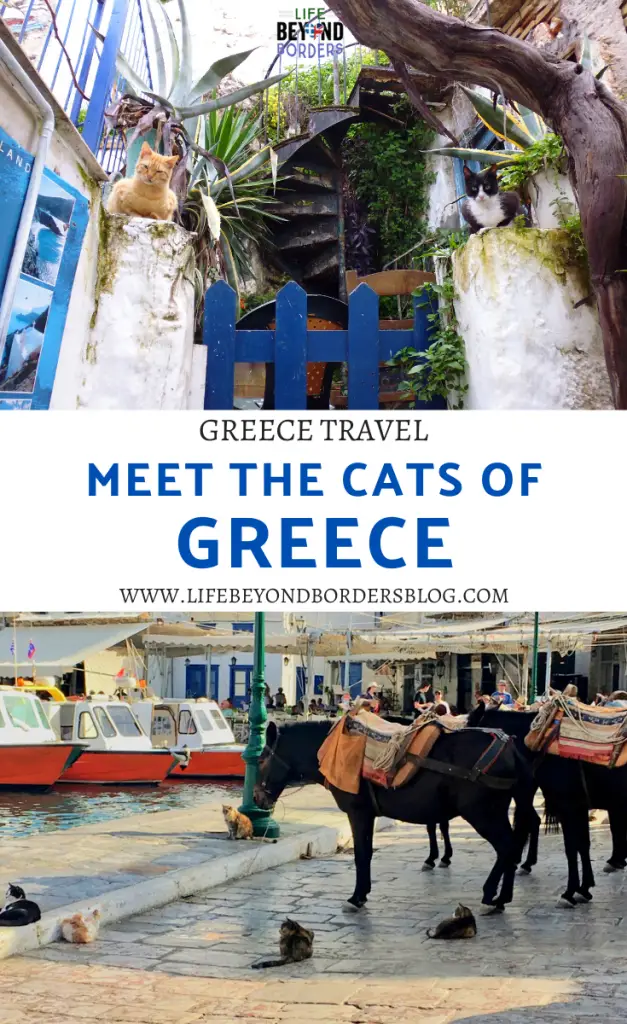Cats of Greece – the attitude
Some may find this post controversial, but don’t forget this is an observation as a British person who lives here.
I’ve lived in Greece for over a decade and notice a very difference of opinion to animals in general in this country – initially when I came I saw that pets weren’t really regarded as such – not necessarily in the bigger cities, attitudes there are changing…but definitely in rural areas. Not just our small feline friends but also dogs. It will seem to the visitor that many roam free – and they do. For example, Riot Dog of Athens was a well known dog, an institution almost.
Cats, however, are seen all over the mainland and islands and admittedly, some in a very sorry state of affairs. It is not all the ‘cute furry cats by tavernas’ that you may think.

But others do lounge lazily outside shop fronts, down cobbled streets and wait by the tables of tavernas or for returning fishermen, hoping for tasty morsels to be dropped their way.
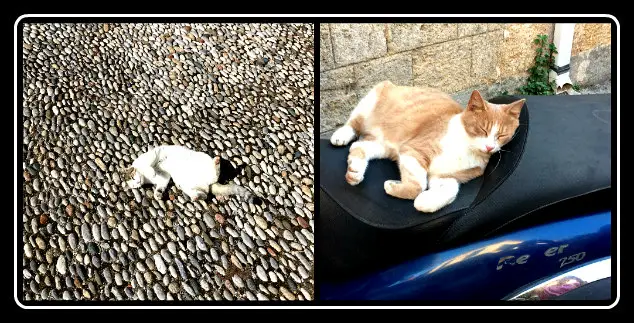
There is no doubt that many are looked after and well fed, but the notion of having a ‘pet’, ie: a member of the family is still somewhat an anathema to the population as the animals are sometimes seen as dirty – but attitudes are changing with the younger generation, thank goodness.
Below: Greek cat on Syros island, lying in a very strange position enjoying the winter sun!
Cat Rescue Organisations in Greece
There are several private organisations to help the cats of Greece. They work tirelessly to help these animals by:
- TNR – Trap, Neuter and Release programmes
- Feeding stations and making sure the cats are especially well looked after during the winter months when tourists are less, especially on islands
- Fostering and adoption programmes, arranging for the animal(s) to be looked after by a fosterer in Greece before re-locating to their permanent home, whether this be in Greece or abroad
- Educate others by going into schools and presenting about their work, basically why animals need our love and care
I stress the fact that there is no such thing as an RSPCA or ASPCA (U.S. equiv), so these organisations are privately funded either with collection boxes placed around the islands and fundraising activities such as bazaars.
Some links to Greek organisations are:
- Syros Cats
- How to help stray animals on Zakynthos
- Takis Shelter in Crete (this is one of my favourites as this man has dedicated his whole life to the animals. Once a DJ, he gave everything to helping the creatures on Crete.
He makes many videos of his finds. Here is his story:
Nine Lives Greece in Athens is another favourite of mine. They undertake several activities such as bazaars to fund their activities.
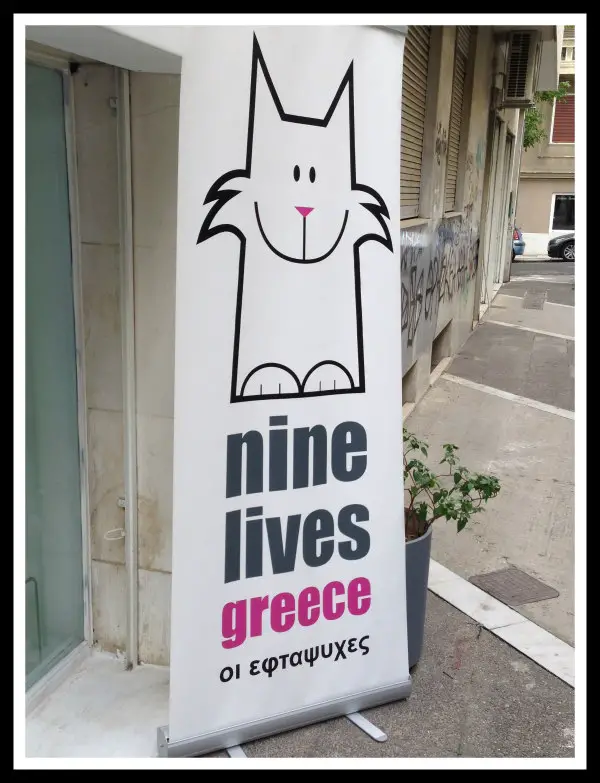
They also operate a fooding programme throughout the year where cats are fed in all the different neighbourhoods of Athens by volunteers.
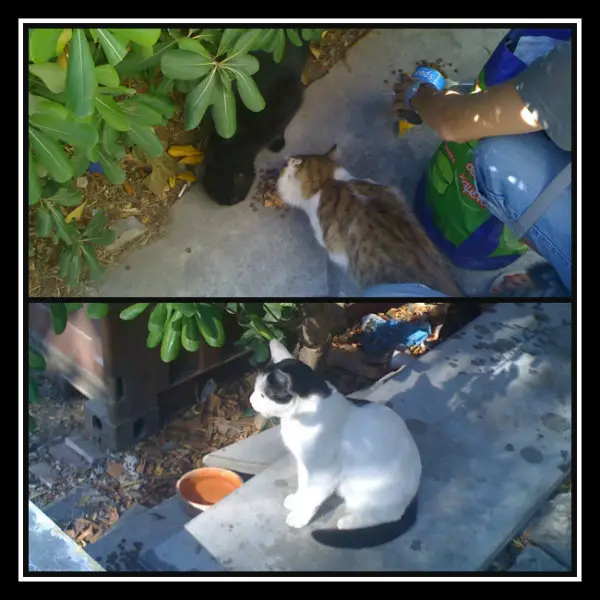
Save a Stray in Athens
See here for more in Athens. There are many other cat and animal organisations across the different islands, etc so be sure to look out for them.
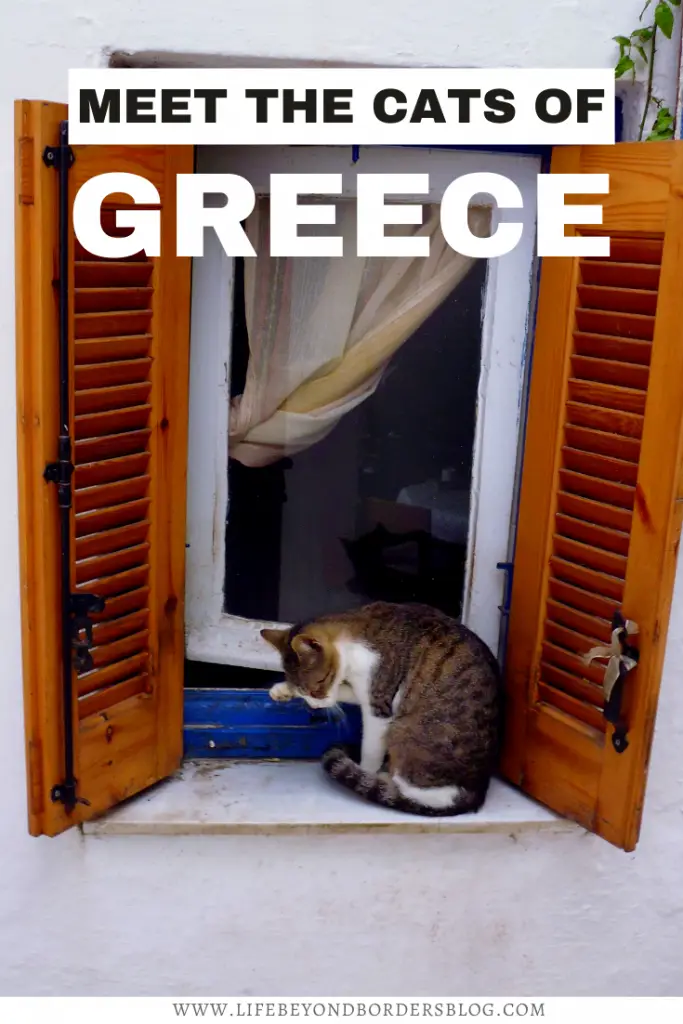
Rescuing Greek Cats
As I live in Athens, initially I was not sure how long I would stay, so I fostered several cats from them, and I did not only save them, I felt they saved me. It can be lonely at first being in a strange city, so to have these little creatures around me and knowing I was helping until they found their forever home really helped.
Below is one of the first cats I got – Branson, so named because he was found dumped near Athens Airport (the name reflecting Richard Branson).
After being with me for about a month, he was finally adopted.

Now I have two Greek cats of my own: Felicity (the black cat) and Moutzouri (meaning ‘dirty face’ in Greek). They were rescue cats too: Felicity having been hit by a car at some considerable speed and has a permanently broken left leg, but she gets around just fine and has a very unique character, very vocal with me in different intonations depending on what she wants and her mood.
She is very confident and is not afraid to go up to strangers and wind herself around their legs…she wins over the hearts of everyone who meets her without fail – even non-cat lovers.
By contrast Moutzouris was quite badly traumatised and abused by being kicked (sad and angry face from me) so of course I couldn’t turn him away when I was asked to help nurse him, and I just couldn’t let him go.
His past trauma means whenever anyone new comes to the house, for example, he runs and hides in the wardrobe/closet and won’t come out until they have gone.
Or if there is a loud noise such as the rubbish bin collectors or even my doorbell ringing, he hides.
With me he is a totally different cat – he has imprinted on me and is very affectionate, often sleeping on my head at night, or on my chest. It’s true what they say: when a cat is so obviously happy with its human, I would rather lose one night’s sleep than risk moving the animal – just to see his little satisfied face after all he’s been through.
You can follow them on their especially set up Instagram, accessed above.
Cats in Greece – General observations
It is nice to wander around the streets and see the animals, especially when they appear to be well looked after by the neighbourhood.
We have one white Greek cat in our neighbourhood who we all think was abandoned by its owner because it’s very friendly.
She is fed by many different people and refuses to come inside: the local bakery, pharmacy, hairdressers and nail parlour all leave food and water out for her, and at roughly 7pm every evening I make sure to pop my head out of the apartment block where I live and jangle my keys and like Pavlov’s Dogs, she comes running and mewling for food which I give her on the doorstep.
The younger generation in particular have a much better attitude to cats in Greece, and interestingly I read this BBC article that claims that actually, it’s the French that are the champions for abandoning pets.
Cats in Greece – Tips
If you’re vacationing here, maybe carry a small bag / box of dried cat food in your bag to scatter down as you go.
- Don’t judge too much – you don’t know the whole story and the cats could be very happy outdoor neighbourhood cats
- Look out for the local animal rescue programme – most islands and places on the mainland have one – and you may be lucky: they may just be running an event such as a Bazaar during your visit
- Why not volunteer? Syros Cats and Takis Shelter are examples of places that accept volunteers
Have you been to Greece and seen the many cats roaming the streets and alleys?
Do you have an adopted Greek cat?
Share in the Comments or head to my Facebook page and share there.
PIN for later
